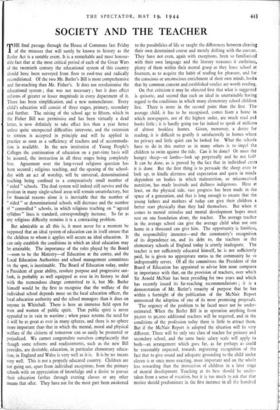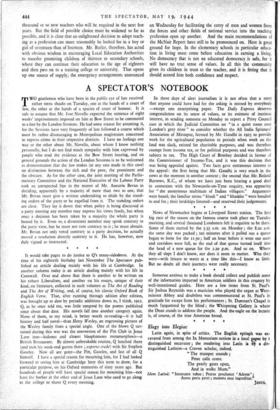SOCIETY AND THE TEACHER
p HE final passage through the House of Commons last Friday 1 of the measure that will surely be known to history as the Butler Act is a notable event. It is a remarkable and most honour- able fact that at the most critical period of each of the Great Wars of the twentieth century the educational system of this country should have been surveyed from floor to roof-tree and radically reconditioned. Of the two Mr. Butler's Bill is more comprehensive and far-reaching than Mr. Fisher's. It does not revolutionise the educational system ; that was not necessary ; but it does effect reforms of greater or lesser magnitude in every department of it. There has been simplification, and a new nomenclature. Every child's education will consist of three stages, primary, secondary and further. The raising of the school age to fifteen, which in the Fisher Bill was permissive and has been virtually a dead letter, is now definitely to take effect less than a year hence unless quite unexpected difficulties intervene, and the extension to sixteen is accepted in principle and will be applied in practice as soon as a sufficiency of teachers and of accommoda- tion is available. In the new institution of Young People's Colleges the continuation of education on a part-time basis will be assured, the instruction in all three stages being completely free. Agreement over the long-vexed religious question has been secured ; religious teaching, and the opening of the school- day with an act of worship, will be universal, denominational teaching being confined to a comparatively small number of aided " schools. The dual system will indeed still survive and the position in many single-school areas will remain unsatisfactory, but for financial reasons alone it is inevitable that the number of " aided " or denominational schools will decrease and the number of " controlled " schools, in which religious teaching on " agreed syllabus " lines is standard, correspondingly increase. So far as any religious difficulty remains it is a contracting problem.
But admirable as all this is, it must never for a moment be supposed that an ideal system of education can in itself ensure that the children to whom it applies will secure an ideal education. It can only establish the conditions in which an ideal education may be attainable. The importance of the roles played by the Board —soon to be the Ministry—of Education at the centre, and the Local Education Authorities and school management committees on the spot, is inestimable. The Board of Education today, under a President of great ability, resolute purpose and progressive out- look, is probably as well equipped as ever in its history to deal with the tremendous charge committed to it, but Mr. Butler himself would be the first to recognise that the welfare of the individual school depends more on the local education officer, the local education authority and the school managers than it does on anyone in Whitehall. There is here an immense field open for men and women of public spirit. That public spirit is never appealed to in vain in wartime ; when peace returns the need for it will be as great as ever in many spheres, and there is no sphere more important than that in which the mental, moral and physical welfare of the citizens of tomorrow can so easily be promoted or prejudiced. We cannot congratulate ourselves complacently that :hough some reforms and readjustments, such as the new Bill provides, are desirable, education, in particular elementary educa- tion, in England and Wales is very well as it is. It is by no means very well. This is not a properly educated country. Children are not going out, apart from individual exceptions, from the primary schools with an appreciation of knowledge and a desire to pursue 'heir education farther through evening classes or any other means that offer. They have not for the most part been awakened to the possibilities of life or taught the differences between cleaving their own determined course and merely drifting with the current. They have not even, again with exceptions, been so familiarised with their own language and the literary treasures it enshrines, plenty of them within their mental grasp as they leave school at fourteen, as to acquire the habit of reading for pleasure, and for the conscious or unconscious enrichment of their own minds, books that by common consent and established verdict are worth reading.
On that criticism it may be objected first that what is suggested is quixotic, and second that such an ideal in unattainable having regard to the conditions in which many elementary school children live. There is more in the second point than the first. The average child, it has to be recognised, comes from a home in which newspapers, not of the highest order, are much read and books little ; it is hardly going too far indeed to speak of millions of almost bookless homes. Given, moreover, a desire for reading, it is difficult to gratify it satisfactorily in homes where no privacy and little quiet can be looked for. What the schools have to do in this matter as in many others is to impel the children to swim against the tide. Can it be done? Or must the hungry sheep—or lambs—look up perpetually and be not fed? It can be done, as is proved by the fact that in individual cases it is done. But the first thing is to persuade the sheep even to look up, to kindle alertness and expectation and quest in minds dependent on bodies in which malnutrition, or misconceived nutrition, has made lassitude and dullness indigenous. Here at least, on the physical side, vast progress has been made in the space of a generation, and that is long enough to ensure that the young fathers and mothers of today can give their children a better start physically than they had themselves. But when it comes to mental stimulus and mental development hopes must rest on one foundation alone, the teacher. The average teacher in the average school can give the average child what not one home in a thousand can give him. The opportunity is limitless, the responsibility immense—and the community's recognition of its dependence on, and its debt to, the teachers in the elementary schools of England today is utterly inadequate. The teacher is not sufficiently educated himself, he is not sufficiently paid, he is given no appropriate status in the community he so indispensably serves. Of all the committees the President of the Board of Education has appointed to advise him none compares in importance with that, on the provision of teachers, over which Sir Arnold McNair has been presiding for two years and which has recently issued its far-reaching recommendations ; it is a demonstration of Mr. Butler's tenacity of purpose that he has within a fortnight of the publication of the McNair Report announced the adoption of one of its most promising proposals.
The urgency of the problem to be faced must not be under- estimated. When the Butler Bill is in operation anything from 5o,00o to 90,000 additional teachers will be required, and in the conditions of the profession today there is little to attract them. But if the McNair Report is adopted the situation will be very different. There will be only one class of teacher for primary and secondary school, and the same basic salary scale will apply to both—an arrangement which goes far, as far perhaps as could be reasonably expected, towards registering recognition of the fact that to give sound and adequate grounding to the child under eleven is at once, more exacting, more important and on the whole less rewarding than the instruction of children in a later stage of mental development. Teaching at its best should be under- taken from a sense of vocation, but it is too much t9 ask that that motive should predominate in the first instance in all the hundred thousand or so new teachers who will be required in the next few years. But the field of possible choice must be widened so far as possible, and it is clear that an enlightened decision to adopt teach- ing as a profession can more reasonably be looked for in a boy or girl of seventeen than of fourteen. Mr. Butler, therefore, has acted with obvious wisdom in encouraging Local Education Authorities to transfer promising children of thirteen to secondary schools, where they can continue their education to the age of eighteen and then pass on to a training college or university. That opens up one source of supply; the emergency arrangements announced on Wednesday for facilitating the entry of men and women from the forces and other fields of national service into the teaching profession open up another. And the main recommendations of the McNair Report have still to be pronounced on. Here is great ground for hope. In the elementary schools in particular educa- tion in living must come before education in earning a living. No democracy that is not an educated democracy is safe, for it will have no true sense of values. In all this the community gives its children in trust to the teacher, and it is fitting that it should accord him both confidence and respect.



























 Previous page
Previous page